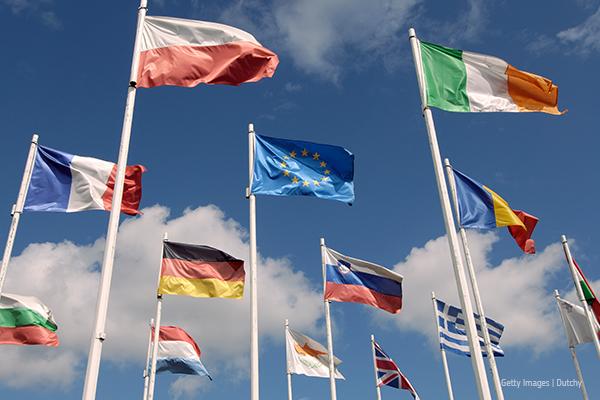The Effort Sharing Regulation (ESR) establishes binding annual greenhouse gas emission targets for Member States from 2021 to 2030. These national targets concern emissions from the following sectors: domestic transport (excluding aviation), buildings, agriculture, small industry, and waste. These sectors account for almost 60% of emissions in the EU.
The ESR is part of a set of policies and measures to reduce the EU’s emissions by at least 55% by 2030, compared to 1990 levels. This is a crucial milestone to deliver the European Green Deal and achieve climate neutrality by 2050.
The Effort Sharing Regulation is also part of the Energy Union strategy and the EU's implementation of the Paris Agreement.
Reducing emissions by 10% by 2020
The Effort Sharing Regulation was preceded by the Effort Sharing Decision establishing the emission reduction targets from 2013 to 2020. The objective was to reduce emissions in the EU by 10% compared to 2005 levels. In 2020, the EU27’s emissions covered by the Effort Sharing Decision were 16.3% lower than in 2005, meaning the EU overachieved its target by six percentage points.
Reducing emissions by 40% by 2030
The Effort Sharing Regulation was adopted on 14 May 2018, with the aim to reduce emissions from key sectors by 30% by 2030 (compared to 2005 levels). On 19 April 2023, following a package of proposals from the European Commission to implement the Green Deal, the Effort Sharing Regulation was amended. Among other changes, the 2030 emission reduction target was set to -40% compared to 2005 levels.
The Effort Sharing Regulation assigns each Member State with an emission reduction target for 2030, a set of annual emission allocations for each year from 2021 to 2030, and flexibilities to deal with annual fluctuations in greenhouse gas emissions due to weather or economic conditions. For more information please see Effort Sharing 2021-2030: targets and flexibilities.
National action
In contrast to sectors in the EU ETS,which are regulated at EU level, Member States are responsible for national policies and measures to limit emissions from the sectors covered by the Effort Sharing legislation. Member States have to adopt their national energy and climate action plans (NECPs), covering the period from 2021 to 2030, in which they set out national objectives and corresponding policies and measures.
Policies and measures could include:
- reducing transport needs
- promoting public transport
- a shift away from transport based on fossil fuels
- support schemes for retrofitting buildings
- more efficient heating and cooling systems
- renewable energy for heating and cooling
- more climate-friendly farming practices
- conversion of livestock manure to biogas.
How EU action helps reduce national emissions
Measures taken at EU level will also help Member States to reduce emissions in sectors covered by the Effort Sharing Regulation. For instance:
- All new cars and vans in the EU must be zero-emission vehicles as from 2035.
- Emission reductions from buildings will be aided by measures to improve their energy performance, eco-design requirements for energy-related products, and energy labelling systems to inform consumers.
- Restrictions on fluorinated industrial gases (F-gases) and implementation of other EU environmental policies, e.g. on soil protection and waste, will also contribute to reaching the national targets.
Gases and sources
The Effort Sharing Regulation covers the seven greenhouse gases:
- carbon dioxide (CO2)
- methane (CH4)
- nitrous oxide (N2O)
- hydrofluorocarbons (HFCs)
- perfluorocarbons (PFCs)
- sulphur hexafluoride (SF6)
- nitrogen trifluoride (NF3)
The targets apply to domestic greenhouse gas emissions from IPCC source categories of energy, industrial processes and product use, agriculture and waste.
- 26/04/2023 - Regulation (EU) 2023/857 - Amending Regulation (EU) 2018/842 on binding annual greenhouse gas emission reductions by Member States from 2021 to 2030
- 16/12/2020 - Commission Implementing Decision (EU) 2020/2126 - Annual emission allocations of the Member States for the period from 2021 to 2030
- 30/05/2018 - Regulation (EU) 2018/842 - Binding annual greenhouse gas emission reductions by Member States from 2021 to 2030 contributing to climate action to meet commitments under the Paris Agreement and amending Regulation (EU) No 525/2013
- 23/04/2009 - Decision No 406/2009/EC - Effort of Member States to reduce their greenhouse gas emissions to meet the Community’s greenhouse gas emission reduction commitments up to 2020
2005 represented the current situation when work began on the economic analysis which underpins the climate and energy package. Calculating emission reductions and renewable energy shares for 2020 and 2030 against 2005 levels therefore gives a transparent and easily understandable picture of the changes needed.
Yes, there is nothing to prevent Member States from adopting their own targets for emissions from sectors under the Effort Sharing Regulation and giving visibility to their own efforts to fight climate change, tracking progress and engaging the public.

